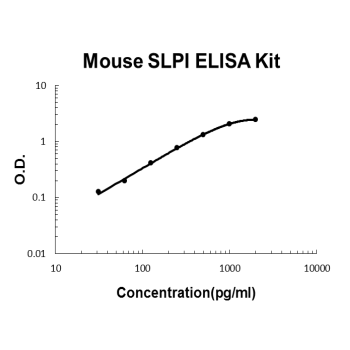Mouse Slpi ELISA KIT (1 x 96 wells)
CAT#: EA102674
For quantitative detection of mouse SLPI in cell culture supernates, serum and plasma (heparin, EDTA).
USD 470.00
3 Weeks*
Size
Product Images

Other products for "Slpi"
Specifications
| Product Data | |
| Format | 8x12 divisible strips |
| Assay Type | Sandwich ELISA kit of Quantitative Detection for Mouse SLPI |
| Assay Length | 3.5 hours incubations; 1 hour washing and analyzing samples |
| Signal | Colorimetric |
| Curve Range | 31.2pg/ml-2000pg/ml |
| Specificity | This kit is used for quantitative detection of Mouse SLPI |
| Sensitivity | <10pg/ml |
| Reactivities | Mouse |
| Cross Reactivity | There is no detectable cross-reactivity with other relevant proteins. |
| Components |
|
| Background | Antileukoproteinase, also known as secretory leukocyte protease inhibitor (SLPI), is an enzyme that in humans is encoded by the SLPI gene. It is mapped to 2; 2 H3. SLPI is a highly cationic single-chain protein with eight intramolecular disulfide bonds. It is found in large quantities in bronchial, cervical, and nasal mucosa, saliva, and seminal fluids. SLPI inhibits human leukocyte elastase, human cathepsin G, human trypsin, neutrophil elastase, and mast cell chymase. X-ray crystallography has shown that SLPI has two homologous domains of 53 and 54 amino acids, one of which exhibits anti-protease activity (C-terminal domain). The other domain (N-terminal domain) is not known to have any function.This gene encodes a secreted inhibitor which protects epithelial tissues from serine proteases. It is found in various secretions including seminal plasma, cervical mucus, and bronchial secretions, and has affinity for trypsin, leukocyte elastase, and cathepsin G. Its inhibitory effect contributes to the immune response by protecting epithelial surfaces from attack by endogenous proteolytic enzymes; the protein is also thought to have broad-spectrum anti-biotic activity. |
| Gene Symbol | Slpi |
| Standard Curve |

Mouse SLPI ELISA Kit Standard Curve
|
Documents
| SDS |
{0} Product Review(s)
0 Product Review(s)
Submit review
Be the first one to submit a review
Product Citations
*Delivery time may vary from web posted schedule. Occasional delays may occur due to unforeseen
complexities in the preparation of your product. International customers may expect an additional 1-2 weeks
in shipping.






























































































































































































































































 Germany
Germany
 Japan
Japan
 United Kingdom
United Kingdom
 China
China